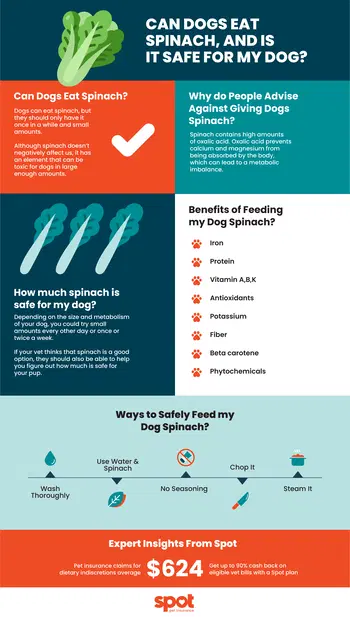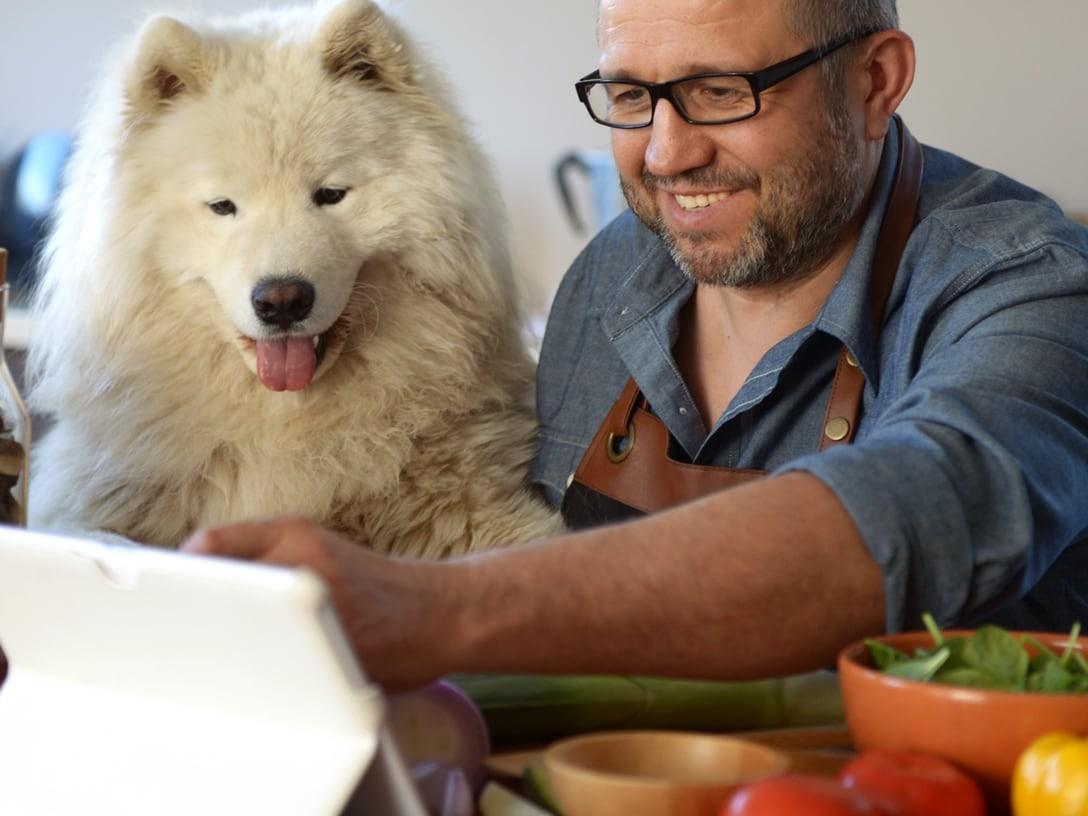Spinach is well-known for being a powerhouse of vitamins and minerals. This superfood may not be the best-tasting food, but it makes an excellent ingredient in salads or smoothies.
If you’re a pet parent, you want to help ensure that your pet is healthy and happy. Since spinach is such an excellent food for us, you might be wondering if it could also be great for our dogs. Does it have the same health benefits? Or is it toxic for dogs?
Keeping track of the human foods your dog should or shouldn’t eat is a tall order. After all, there are a lot of different foods to research and look into. We’re here to help.
At Spot Pet Insurance, we aim to help good pet parents improve. We understand that being a pet parent can be difficult sometimes, especially when our pets enjoy getting into things they aren’t supposed to.
By providing educational resources like this one, we hope to help you figure out what your dog can eat, what’s good for them, and what you should avoid altogether. So, where does spinach fall on that list? Can dogs eat it? Should dogs eat it? Let’s find out.

Can Dogs Eat Spinach?
Spinach is a leafy green with a lot of nutritional value, which is why we’re encouraged to eat it as humans. We have many different ways to eat spinach, but is it safe for our dogs to consume it?
Dogs can eat spinach, but they should only have it once in a while and small amounts.
Although spinach doesn’t negatively affect us, it has an element that can be toxic for dogs in large enough amounts. However, spinach also has a lot of nutrients that dogs need.1
Most dogs already have these nutrients in their kibble, so spinach isn’t necessary. If you’re making dog food on your own, spinach can be helpful, but there are other foods you can use that have the nutrients your pup needs.
Before making changes to your dog’s diet, you should consult your pup’s vet since they know your dog. They can help you determine your dog’s needs based on weight and overall health.
You also need to know the benefits and risks of feeding your dog spinach before you make a decision.
What Are The Benefits of Feeding My Dog Spinach?
Dogs are omnivores. Although their primary food source is meat in the wild, sometimes, they will supplement their diet with plants when meat is difficult to come by.2 Lots of plants, like spinach, have some of the nutrients dogs need for a well-balanced diet.
Spinach can lead to plenty of health benefits since it contains components like:1
Iron, which helps form red blood cells
Protein
Fiber, which helps with digestion and can help prevent heart disease
B vitamins, which help your dog turn food into energy (metabolism)
Antioxidants, which protect cells from damage
Vitamin K, which helps your dog’s blood clot properly
Phytochemicals that can protect your pup from high blood pressure or diabetes
Beta carotene, which is used in the immune system
Vitamin A, which helps your pup’s immune system
Potassium, which can help support heart health
These are only a few of the health benefits of spinach for our pups and us. However, other vegetables, like asparagus, broccoli, and cauliflower, have similar benefits. Many vegetables will not have the high honors that spinach has, but they can still be suitable for your pet.
Your pup will get most of these health benefits from their dog food, so it’s not necessarily something you should worry about, as long as you provide good quality, well-balanced kibble.
Why Do People Advise Against Giving Dogs Spinach?
If spinach has all these fantastic benefits, why is it dangerous for dogs? Well, the vitamins and minerals listed above aren’t the only things in spinach.
Spinach also contains high amounts of oxalic acid. Oxalic acid prevents calcium and magnesium from being absorbed by the body, which can lead to a metabolic imbalance. The oxalates in oxalic acid bind with magnesium and calcium, making your pup deficient in these two essential elements.3
Since the calcium oxalate (the combination of calcium and the oxalate) goes through the kidneys on the way out, it can also cause kidney damage, and could eventually lead to kidney failure.3
However, while oxalates can cause kidney damage, they only do so in large amounts. Dogs can process a small number of oxalates, so if you space out the times you feed your pup spinach and only give them a little bit, your may be okay.3
If you feed your dog spinach often or in large amounts, they could show symptoms like difficulty breathing and respiratory paralysis, weakness, and heart beating abnormally.2 You may also notice vomiting or other stomach issues, resulting from having too much of the minerals listed in the previous section.
Are There Ways To Safely Feed My Dog Spinach?
If you decide to feed your dog spinach, it’s essential to learn how to prepare it properly. Raw spinach is hard for dogs to digest, so it has to be cooked properly. What’s the best way to prepare spinach?
The best form of spinach to give your dog is steamed spinach. It’s not as challenging to eat as raw spinach, and if you boil it, many of the nutritional benefits are lost. Before cooking the spinach, wash it first to ensure there isn’t bacteria on it.1
When you’re cooking spinach, you should only use water and spinach. Oil or butter has too much fat to be healthy for your dog. Popular seasonings, like onion or garlic, can be toxic for dogs. Usually, plain spinach is the best way to go.
Spinach should also be chopped up before you give it to your dog. Whole spinach leaves might be difficult for your pup to chew and digest.
How Much Spinach is Safe for My Dog?
Spinach should only be fed to dogs in small amounts, and it shouldn’t be a daily treat. Depending on the size and metabolism of your dog, you could try small amounts every other day or once or twice a week.1
The safe serving size of spinach depends on the size of your pup. Large dogs might be able to eat more than small dogs. If your vet thinks that spinach is a good option, they should also be able to help you figure out how much is safe for your pup.
The health of your dog’s kidneys can also be a factor in how much spinach they can eat. A dog with damaged kidneys won’t be able to eat as much spinach as a dog with healthy kidneys.1
My Dog Ate A Lot of Spinach; What Should I Do?
If your dog manages to get into some spinach, your first action should be to call your vet. They can advise you on whether you need to keep an eye on your dog for signs of blockage or stomach problems or if it’s a better idea to bring your dog in. It will primarily depend on how much spinach your dog ate.
We’ve mentioned before the symptoms caused by an excessive amount of oxalic acid, from breathing issues to an abnormal heart rate. It’s also a good idea to keep an eye out for issues like vomiting, diarrhea, or constipation.2
If your pup is showing any of these symptoms, take them to an emergency vet. Some of these symptoms could mean that your pup is having problems digesting spinach, but others might be a sign of kidney damage.
Should I Feed My Dog Spinach?
Spinach is a superfood for humans, but it may not be the best option for your pup. Although it has some amazing health benefits, it also contains oxalic acid, which causes calcium deficiency, preventing your pup from getting the energy they need from food.3
Fortunately, dogs can process very small amounts of oxalic acid. So as long as you only feed your pup small portions every once in a while, your pup should be okay.3 However, it is always best to consult with a vet before adding anything new to your pup’s diet.
A pet parent that prepares spinach correctly and ensures the portion is just the right size can feel slightly more safe about giving their dogs spinach. Just remember that spinach should only be an occasional treat for our furry family members.
We wouldn’t really recommend spinach, but if your vet thinks it might help your pup, we sure hope it keeps your pup happy and healthy.
Expert Insights from Spot
While sharing our favorite foods with our pets can be tempting, it's important to remember that not all human foods are safe for dogs. Spot's internal data shows that pet insurance claims for dietary indiscretions average $642*, highlighting the importance of caution and research before sharing snacks with your pet.
What Other Vegetables Can Dogs Eat?
Though our canine companions cannot enjoy every food we can, several veggies are safe for dogs and humans. We have compiled a list of all vegetables that dogs can eat for you! Dogs can eat various veggies you might have on hand, such as sweet potatoes, cabbage, eggplant, radishes, carrots, beets, corn, peas, potatoes, ginger, squash, pumpkins, zucchini, and so many more! All vegetables offer different nutritional values and benefits, so it’s always a good idea to introduce your dog to different vegetable types.

The resident animal enthusiast at Spot. I have a lifetime of pet parent experience. If it has fur, feathers, or scales, I’ve probably shared my home with it. I aim to be a reliable source, blending experience with a dedication to the well-being of pets.
*Jan 2019 to April 2024 administrator claims data.
Son, Katelyn. “Can Dogs Eat Spinach? Your Guide On This Superfood for Canines.” One Vet, 23 June 2024, www.onevet.ai/can-dogs-eat-spinach/.
Reisen, Jan. “Can Dogs Eat Spinach?” American Kennel Club, American Kennel Club, 3 Aug. 2022, www.akc.org/expert-advice/nutrition/can-my-dog-eat-spinach/.
Lesser, Jennifer. “Can My Dog Eat Spinach?” The Spruce Pets, The Spruce Pets, 23 Aug. 2022, www.thesprucepets.com/can-dogs-eat-spinach-5101459.
The information presented in this article is for educational and informational purposes only and does not constitute or substitute for the advice of your veterinarian.












